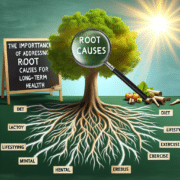"Why Focusing on Symptoms Is Not Enough in Healthcare"
Focusing on Symptoms Is Not Enough in Healthcare
As a holistic wellness healthcare specialist, it is crucial to understand that focusing solely on symptoms is not enough to truly address the underlying issues that may be affecting a person’s overall well-being. By only treating the symptoms, we are merely masking the problem rather than addressing the root cause.
Why Symptoms Are Only the Tip of the Iceberg
- Masking the Issue: Treating symptoms without understanding the underlying cause is like putting a band-aid on a wound without cleaning it first. The problem may still persist beneath the surface.
- Ignoring the Body’s Signals: Symptoms are the body’s way of communicating that something is wrong. By ignoring these signals and only focusing on alleviating the symptoms, we are neglecting the body’s natural warning system.
- Short-Term Solutions: Addressing symptoms may provide temporary relief, but without addressing the underlying issue, the problem is likely to resurface in the future.
- Physical and Emotional Connection: Symptoms are often intertwined with emotional and mental health issues. By solely treating the physical symptoms, we may be missing out on addressing the emotional and mental aspects of a person’s well-being.
The Benefits of Holistic Healthcare
As a holistic wellness healthcare specialist, it is essential to take a comprehensive approach to healthcare that integrates the physical, emotional, and mental aspects of a person’s well-being. By focusing on the whole person rather than just the symptoms, holistic healthcare can provide numerous benefits, including:
- Identifying Root Causes: By looking beyond the symptoms, holistic healthcare practitioners can identify the underlying root causes of a person’s health issues and develop treatment plans that target these causes.
- Promoting Long-Term Health: Holistic healthcare focuses on promoting overall well-being and preventing future health issues by addressing the underlying imbalances in the body.
- Improving Quality of Life: By addressing the physical, emotional, and mental aspects of health, holistic healthcare can improve a person’s quality of life and help them achieve optimal wellness.
- Empowering Patients: Holistic healthcare empowers patients to take an active role in their health by providing them with the knowledge and tools they need to make informed decisions about their well-being.
Conclusion
As a holistic wellness healthcare specialist, it is important to recognize that focusing only on symptoms is not enough to truly promote optimal health and well-being. By taking a holistic approach that addresses the physical, emotional, and mental aspects of a person’s health, we can uncover the root causes of health issues and create personalized treatment plans that support long-term wellness.









